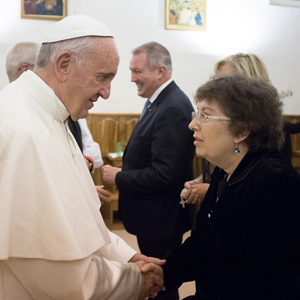The Pope has identified the publishing of disinformation as the greatest sin of the media today. In an interview with the Belgian Catholic weekly Tertio, Francis was asked what he regarded as the most damaging aspect of contemporary communications.
“The means of communication are the builders of a society … they are made to build, to interchange, to fraternise, to make us think, to educate. In themselves they are positive,” he said. However, he went on to describe how they can be used to cause harm. “They can be tempted by calumny, and therefore used to slander, to sully people, especially in the world of politics,” he said.
He gave, as an example, that of a journalist uncovering “something that is true, but already in the past, and which has already been paid for with a jail sentence, with a fine, or whatever”.
“There is no right to [do] this. This is a sin and it is harmful,” he said.
He went on to condemn specifically the spreading of “disinformation”. “Faced with any situation, saying only a part of the truth, and not the rest. This is disinformation.” “Because you,” he said indicating journalists as a profession, “to the listener or the observer, give only half the truth, it is not possible to make a serious judgement. Disinformation is probably the greatest damage that the media can do, as opinion is guided in one direction, neglecting the other part of the truth.”
He then reverted to a colourful description of this tendency. “I believe that the media should be very clear, very transparent, and not fall prey – without offence, please – to the sickness of coprophilia, which is always wanting to communicate scandal, to communicate ugly things, even though they may be true.”
Continuing his critique of contemporary society he distinguished between “healthy secularism” – which is “better than a confessional State, because confessional States finish badly” - and “laicism”. Laicism was a problem for our times, he said, because it “closes the doors to transcendence … both transcendence towards others and, above all, transcendence towards God; or towards what is beyond us. And openness to transcendence is part of the human essence.”
Asked about links between religion and war or terrorism, Francis repeated his belief that “war cannot be waged in any religion”. Acknowledging, without naming, the Islamist atrocities in Belgium earlier this year, he said: “You are witnesses of this, you have experienced it in your homeland. But they are distortions of religion, that do not relate to the essence of the religious fact, which is instead love, unity, respect, dialogue, all these things.” He reiterated his insistence that religion is “distorted” if it is used to justify war and terror, and that “all religions have fundamentalist groups… we do too.”
Fundamentalists tend to be “small religious groups” that have “distorted and sickened” their religion, he claimed.
Turning to the just-ended Year of Mercy he said that, in instituting it, he was following in the steps of Blessed Paul VI and St John Paul II.
“Blessed Paul VI had already taken a number of steps to rediscover God’s mercy. St John Paul II then placed great emphasis on this with three facts: the Encyclical Dives in Misericordia, the canonisation of St Faustina, and the Feast of Divine Mercy on the Octave of Easter; he died on the eve of that feast day. He introduced the Church on to this road in this way. I felt that the Lord wanted this,” Francis said.
Describing the process that led to the publication of the apostolic exhortation Amoris Laetitia, he referred to the synods on the family of 2014 and 2015 in which it was formed. “Each person said what he thought, without fear of feeling judged. And everyone had the attitude of listening, without condemning. And then we discussed, like brothers, in the groups. But it is one thing to debate like brothers and another to condemn a priori. There was great freedom of expression. And this is beautiful! … It is unity in diversity. This is synodality.”
And what does the world need today? He was asked. “Tenderness,” he replied. “Priests should never be ashamed of having tenderness. May they caress the suffering blood of Jesus. Today there is a need for a revolution of tenderness in this world.”


 Loading ...
Loading ...